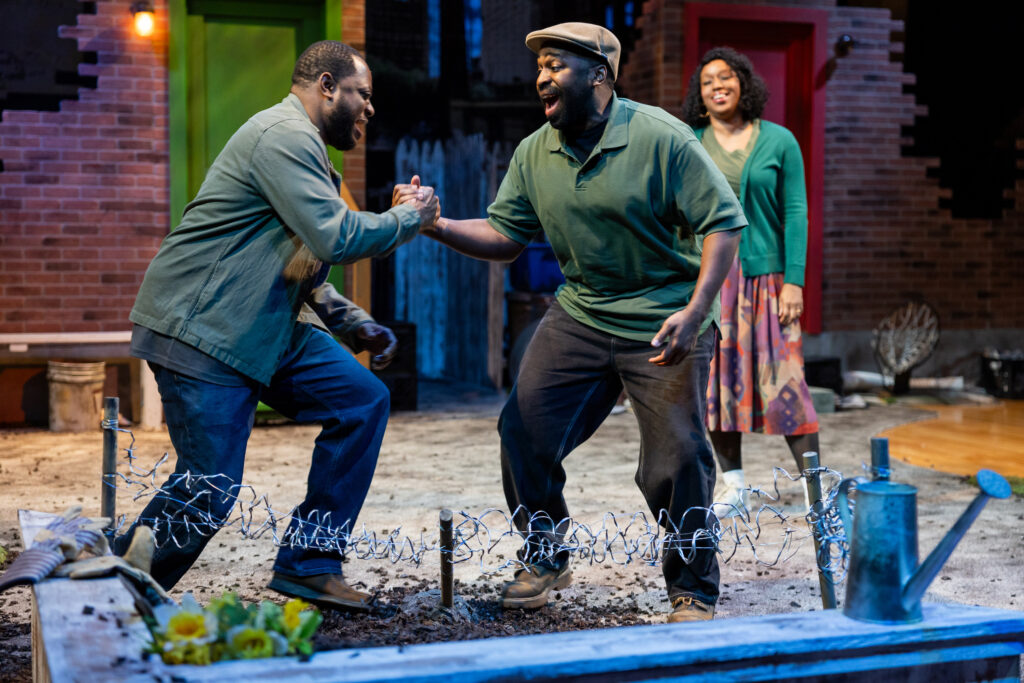
‘King Hedley II’ – Written by August Wilson; Directed by Summer L. Williams; Scenic Designer: Jon Savage; Costume Designer: Becca Jewett; Lighting Designer: Anshuman Bhatia; Sound Designer: Caroline Eng. Presented by Actors’ Shakespeare Project at Hibernian Hall, 184 Dudley St, Roxbury, through April 7, 2024
By Shelley A. Sackett
August Wilson’s King Hedley II, the Pulitzer Prize nominated play, is set in 1985 in the same Pittsburgh Hill District backyard where Wilson set his previous work, Seven Guitars (which received a knock out production in 2023 by Actor’s Shakespeare Project). Jon Savage’s same terrific set (and Anshuman Bhatia’s spot-on lighting) adds continuity and interest.
It’s now 40 years and several generations later, and the upbeat, soulful guitar blues arias soundtrack of Seven Guitars has been replaced by a thrumming funeral march set in a minor key.
Hill District is a poster child for its era: the promised trickle-down effect of Reaganomics has instead trickled up, and Black communities, always hampered, are now in a keyless lockbox.
Murder and crime are bit players in this tragedy of dreams confused and deferred, lurking behind every door and hiding under every unturned stone. Yet, as always, Wilson manages, through sheer artistic genius, to find a glimmer of light in this dark place. As with all ten of his Century Cycle plays (also called The Pittsburgh Cycle, a collection of ten plays that span across decades to document African American experiences in the 20th century), it is family and community that are Wilson’s main focus.
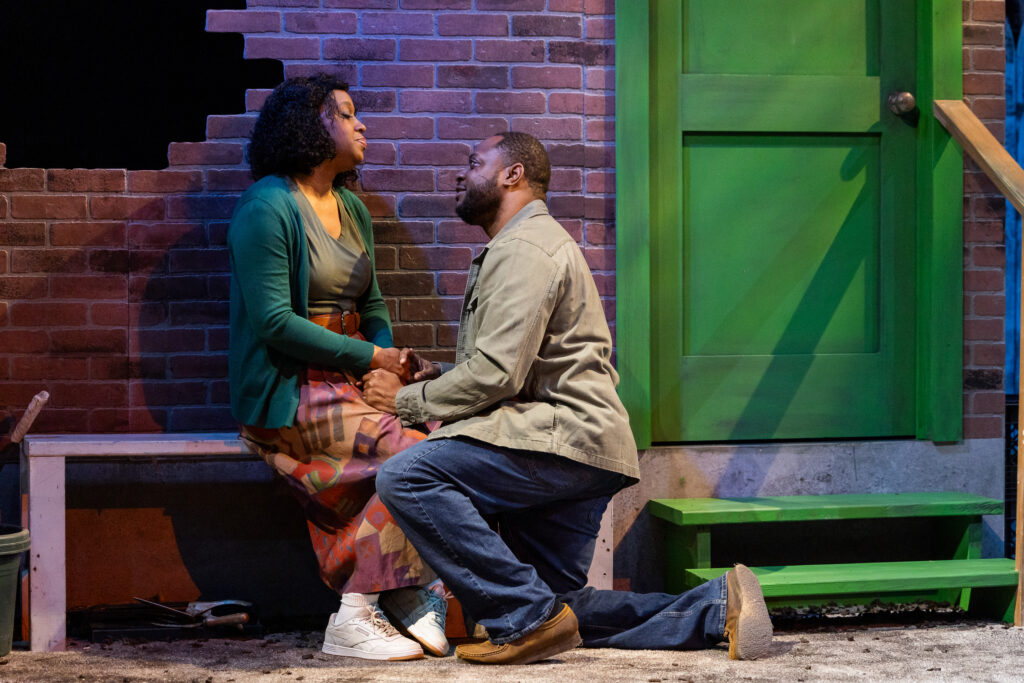
And it is through their words — brilliantly crafted dialogues, monologues and epistles — that he brings his characters to life and prevents the play from spiraling into a bottomless abyss of sorrow and gloom.
Which is a good thing, because King Hedley II’s backstory has already taken place when it begins. Much of its 90-minute first act is characters talking about what has already happened or what is happening offstage. Telling rather than showing rarely makes for thrilling theater.
Luckily, Wilson can create whole worlds through his dialogue.
King Hedley II fast forwards from where Seven Guitars ended. King (an outstanding James Ricardo Milord), last “seen” in utero, is now in his late thirties. He has just returned from a seven-year stint in prison and has a huge scar on the left side of his face, a reminder that he killed a man and a source of his unease and insecurity.
“Anyone who killed someone has no right to God. Living without God is the ultimate punishment,” a character says.
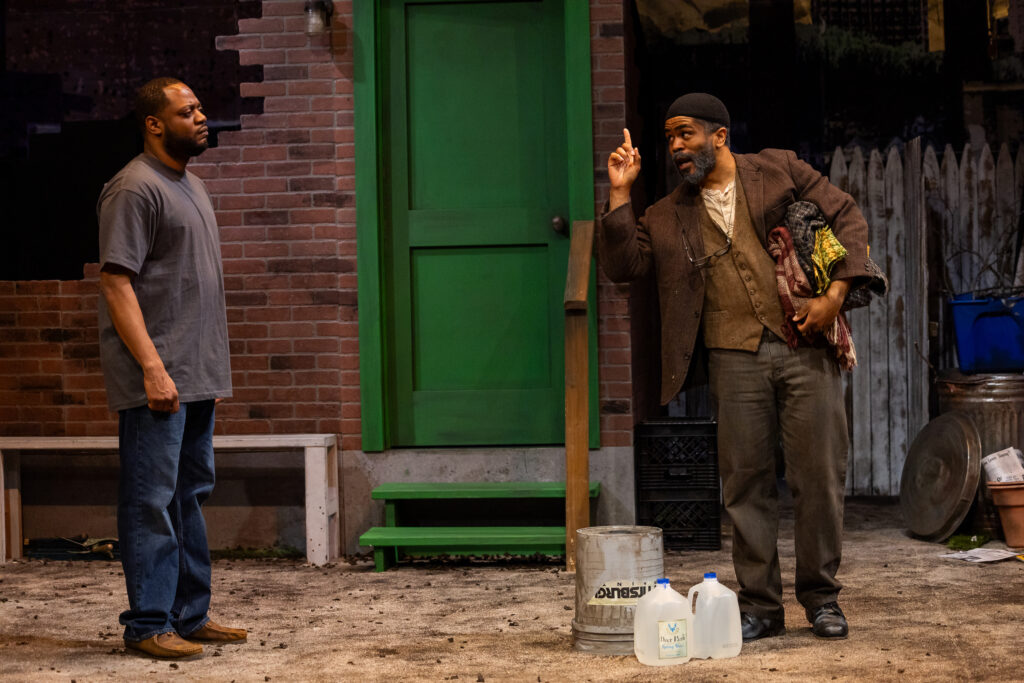
He is desperate to restart his life. His to do list includes resuming his relationship with his second wife Tonya (Karimah Williams) and getting $10,000 so he and boyhood best friend Mister (an effectively under-stated Omar Robinson) can open a video store.
King and Mister have amassed a pool of cash by selling refrigerators with suspicious chains of ownership to their Black neighbors and supplementing that with recreational crimes like a midday jewelry heist. Despite pressing immediate needs for the money — Mister’s wife left him and took all the furniture; King wants to move from the Hill District to give him, Tonya and their expected baby a fresh start — they tamp down these immediate gratification urges in favor of the patience needed to achieve their American dream.
Ruby, (Patrice Jean-Baptiste, in a role and under direction that, after the disappointing Trouble in Mind, thankfully allows her to strut her acting chops) a sixty-something former blues singer who recently moved back to Pittsburgh, is King’s biological mother. When we last saw her, she was a 20-something spitfire visiting her Aunt Louise. Pregnant by one of her two lovers (Leroy Slater or Elmore), she ended up leaving King with Louise and her boyfriend, King Hedley, who assumed the role of the boy’s father. The two raised King, although Hedley I died when he was three.
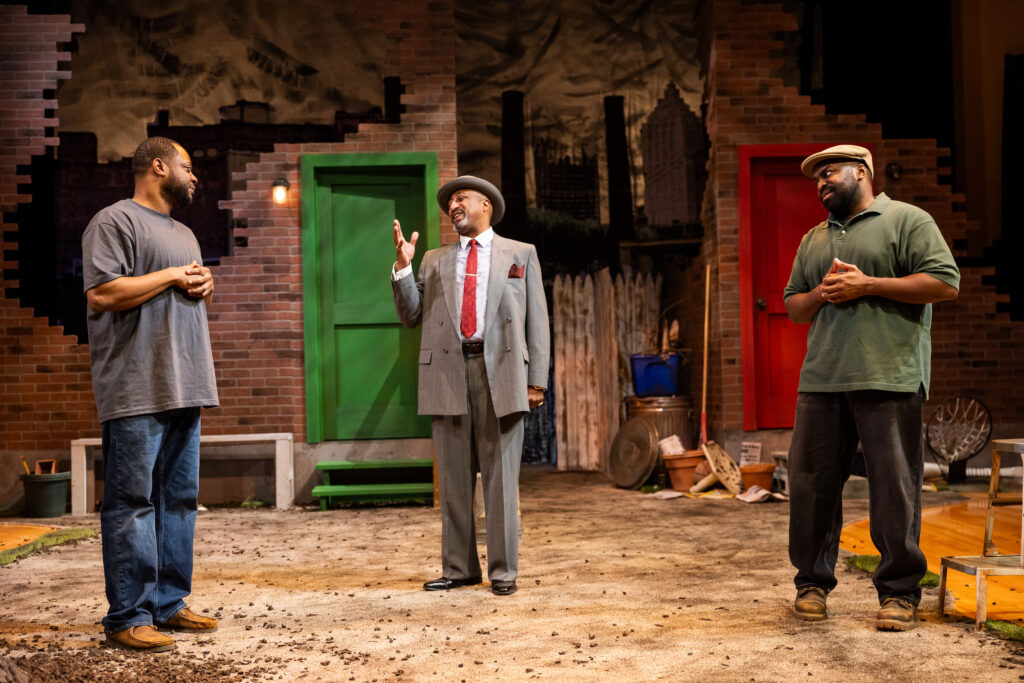
Aunt Louise recently died and Ruby is back to claim her rightful property inheritance. She also wants to take a stab at establishing a mother-son relationship with King. Still hot on her trail is Elmore (a best-in-show Naheem Garcia), the unapologetic, charismatic snake-oil salesman who blows with the wind as long as that wind involves a con and carries Ruby’s scent. The two are moths drawn to each other’s flames, and it’s with a comparatively light heart that the audience watches their pas de deux, wondering how close they can dance before singeing their wings and retreating.
Stool Pigeon (Brandon G. Green) rounds out the cast, and as Greek chorus and narrator, his role is crucial. Through him, Wilson permeates his script with Black folklore, scripture, societal observation and bigger picture commentary. He picks up where King’s titular father, Hedley I, left off.
In Seven Guitars, Hedley I is an old man, not altogether right in the head, who has turned his back on the white world he loathes. He’s a Caribbean islander, a believer in saints, spirits, prophets and the ghost of Charles (Buddy) Bolden, the legendary New Orleans trumpeter who died in an insane asylum. More than anything else, Hedley would like to sire a messiah. (Throughout King Hedley II, King asks, “Is there a halo around my head?”)
Stool Pigeon’s opening prologue (the first time Wilson used this device in a Cycle play) gives context and content while firmly establishing his position as Hill elder spokesman, conduit to the outside world, and spiritual and practical truthsayer.
As the play opens, he has just learned Aunt Ester, who lived nearby, has died at age 366. (Interesting sidenote: that would mean she was born in 1619, the first year a documented African arrived in the continental US and a year before the Puritans landed. Throughout the Cycle plays, she has been the embodiment of African wisdom and tradition.)
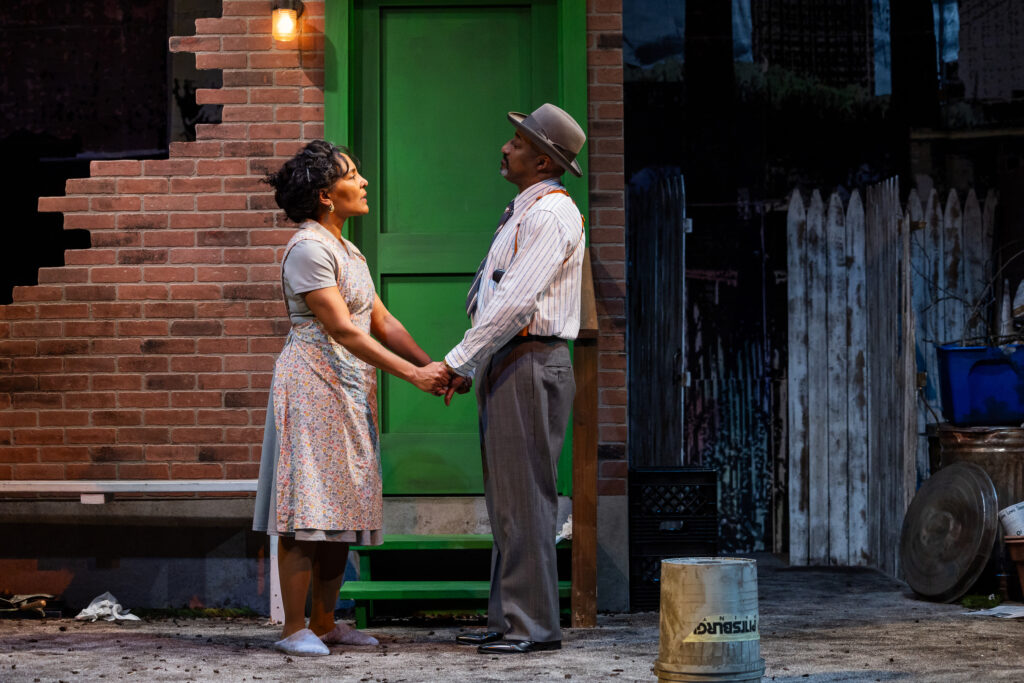
Her death devastates the Hill District community. Stool Pigeon warns, “Lock your doors! Close your windows! Turn your lamp down! We in trouble now.”
He worries that without Aunt Esther to guide them, they will be lost and future generations of the Black community are at risk of never knowing where they came from.
“The people need to know the story. See what part they play,” he says. “God has already written the script, and man’s role is to play his part as written. Period.”
Their fates may be in God’s hands, but as for the ability to understand the meaning of it all and make the lack of free will bearable, well that’s another story altogether. “(God) said, ‘Let he who has wisdom understand.’ Aunt Esther got the wisdom. All that’s left now is the playing out,” Stool Pigeon says.
And for over three hours (plus one 20-minute intermission), the outstanding cast of King Hedley II does just that. Under Summer L. Williams’s crisp-paced and compassionate direction, the ensemble plays it out as both a single collective and a collection of individuals.
Notwithstanding their flaws, violent streaks and knuckleheaded moves, the men are at heart decent, caring and wanting to do the right thing. They can be whimsical and curious, undaunted by repeated set-backs. “Life is funny,” one says. “I keep trying to figure it out.”
Tonya and Ruby are voices of logic and healing, reality checks in a world where murder is a male rite of passage and a single slight can rip a dream to shreds.
King Hedley II tackles some meaty issues, both concrete and existential. Guns are everywhere, as are the consequences of their use and misuse. Poverty and conflict go hand in hand, as do death and deceit. Life is a gritty game where the white man makes the rules and those rules are in constant flux.
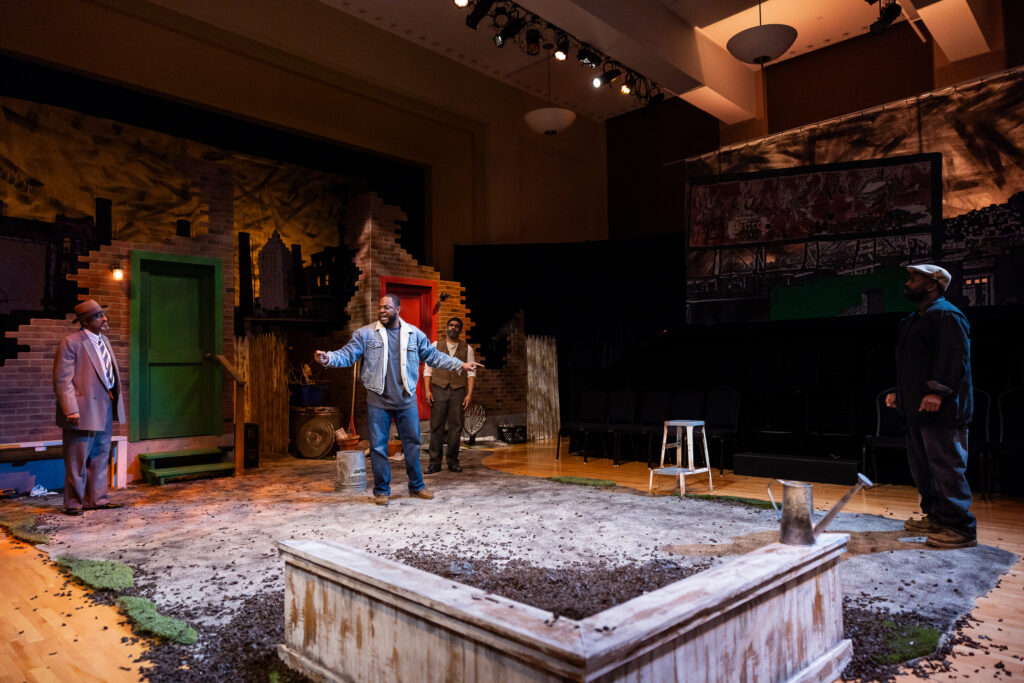
Yet the overarching question — how can a Black person survive, let alone thrive, in racist country? — is treated with thoughtfulness and introspection. King embodies and epitomizes the agony of trying to raise a family when all the odds are stacked against his success. “How do you build a better future when everything around you is going to shit?” he asks.
Nonetheless, his destiny is to try. When Tonya advocates for abortion over bringing a child into a world where motherhood is reduced to trying to keep that child alive, King chides her for having the baby buried before he’s born. He needs this baby both as a legacy (he already refers to him as King Hedley III) to redeem himself and as a way to prove that he has the ability to do something right.
This blind optimism is epitomized by King’s determination to force seeds to grow in a dried up patch of ground in the backyard in the middle of a slum. The image of him on his knees, tenderly tilling the dirt and rejoicing at the first signs of life, are heartbreaking and exhilarating. While the play ends on a disturbing note, this is the image remains: the extraordinariness that this ordinary man can do an ordinary thing on an ordinary day. For tickets and information, go to: https://www.actorsshakespeareproject.org/

